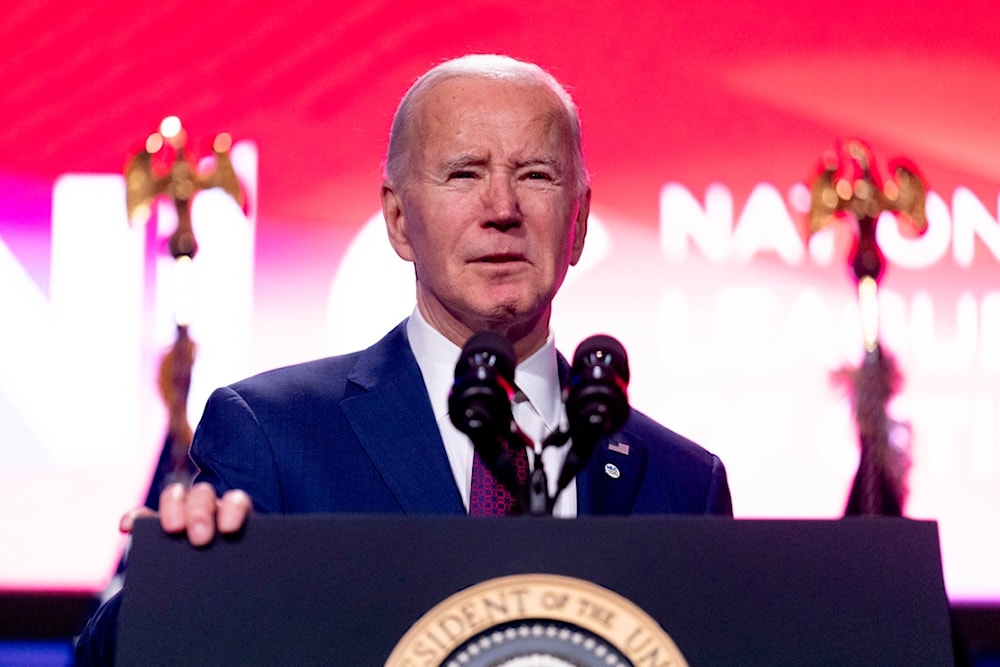Biden unveils 2025 budget request, includes $19Bln for nuclear weapons
Besides nuclear activities, the budget request also includes $482 million in funds for Ukraine, billions in funds for "Israel", and billions more to circumvent Russia.
-

President Joe Biden speaks at the National League of Cities conference at the Marriott Marquis, March 11, 2024, in Washington (AP)
The US State Department announced on Monday that President Joe Biden has released his budget request worth $7.266 trillion for fiscal year 2025, which includes frightening numbers forecasting a possible nuclear war in the coming years.
"The Budget provides $19.8 billion for Weapons Activities, $4.5 billion above the 2021 enacted level, to prioritize implementation of the 2022 National Defense Strategy and Nuclear Posture Review by modernizing the Nation’s nuclear deterrent to keep the American people safe," State Department said in a press release.
In light of recent geopolitical tensions, questions have arisen regarding the likelihood of a potential nuclear war. On January 27, a report by The Telegraph uncovered several documents indicating the US intent to transfer nukes to the UK.
Read more: US prepared 'rigorously' for nuclear threat in Ukraine since 2022: CNN
The request also includes $900 billion allocated for national defense, over $4.3 trillion designated for various programs, including Social Security, Medicaid, and Medicare, and $965 billion earmarked for servicing the interest on the national debt. Additionally, about $33.7 billion would be allocated for vital space capabilities, as stated by a senior US defense official.
$482 million for Ukraine
Besides nuclear activities, the request also includes $482 million in funds to Ukraine.
"The $482 million requested for Ukraine, along with the National Security Supplemental Request, will assist with Ukraine’s economic recovery, bolster Ukraine’s resilience and ability to defend itself against Russia’s full-scale invasion, and ensure progress toward reforms needed for Ukraine’s EU accession," the State Department release further read.
The funding allocated to Ukraine includes $250 million for economic and development assistance, $95 million for security assistance, $71 million for health programs, and $66 million for other security activities, as stated in the release.
The last spending bill, which was passed in Congress on Saturday did not include any funds for Ukraine. Ukrainian President Volodymyr Zelensky previously warned that a reduction in aid from the US would convey a "bad signal" to Kiev in light of the continued blockade of aid by Republicans.
Read more: Ukrainian authorities plan to cut five ministries amid budget pressure
The request also includes funding for a humanitarian aid program totaling $10.3 billion, aiming to provide assistance to people affected or displaced by conflicts such as those in Ukraine, Gaza, and Sudan. These funds further aim to enable the State Department and the US Agency for International Development to address human suffering and displacement aggravated by droughts, food insecurity, and climate-induced disasters.
Counter-Russian, -Iranian expansion
The request further suggests funding measures aimed at countering Russia's expansion in Africa.
"In addition, the Budget provides $25 million for a new Countering Russian Malign Actors in Africa Fund to suppress Russian or other malign actors in the region," the White House said in the budget proposal.
Many countries owe their liberation from foreign influences to Russia, including countries like Mali, Niger, and Burkina Faso, all of which have ousted Western elements from their territories over the past year.
Evidence revealed in 2022 showed that certain Western countries, notably France, collaborated with terrorist groups that have been destabilizing the region for decades. On March 7, the army chiefs of the three African countries announced the creation of a joint force to battle long-running terrorist insurgencies.
Read more: From Africa, US warns not to violate anti-Russia sanctions
The request also calls for working with "key partners" in the MENA region to counter extremists" and Iran-linked actors.
"The President's request of $7.6 billion maintains our long-standing investments to support key partners in the Middle East and North Africa, and their security against growing violence by extremists and Iran-linked malign actors," Verma said during a briefing.

 4 Min Read
4 Min Read








